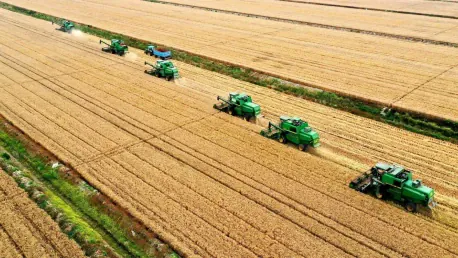In a groundbreaking initiative that aims to revolutionize agricultural technology, the University of Nebraska–Lincoln (UNL) has embarked on a project to develop secure technologies for the rapidly expanding realm of the Agricultural Internet of Things (Ag-IoT). With a $582,987 grant from the National Science Foundation’s Secure and Trustworthy Cyberspace program and the Established Program to Stimulate Competitive Research (EPSCoR), this project is dedicated to addressing the growing security concerns in the Ag-IoT sector. Assistant Professor Nirnimesh Ghose is leading the initiative, working closely with Mehmet Can Vuran and Yufeng Ge, professors from the School of Computing and biological systems engineering, respectively.
Security Vulnerabilities in Ag-IoT
The Rise of Ag-IoT and its Challenges
Agricultural Internet of Things, or Ag-IoT, integrates smart technologies such as wireless sensors and automated data collection systems to significantly enhance the efficiency, profitability, sustainability, and yield of farming operations. As farmers and agricultural companies increasingly adopt these technologies, the benefits become more evident. However, the swift and widespread implementation of Ag-IoT introduces notable security risks. Traditional security measures have proven inadequate to cope with the scale, complexity, and specific requirements of these systems. This inadequacy has left Ag-IoT systems vulnerable to various threats, including malicious data injection and unauthorized access to sensitive information.
The potential damage from compromised Ag-IoT networks is substantial. Assistant Professor Nirnimesh Ghose emphasizes that unsecured systems could lead to serious consequences such as uneven irrigation, severe flooding, or crop damage, which can devastate entire farming operations. These risks underscore the urgent need for robust security solutions tailored for the unique environment of agricultural settings. The project’s aim is to encourage the development of scalable and effective security measures that will protect these advanced technologies while ensuring their continued functionality and benefits.
Addressing Security Through Innovation
In response to these vulnerabilities, the UNL team is set to develop an innovative method for identity authentication and message integrity verification, known as Soil-Assisted Things Trust Verification for Ag-IoT. This cutting-edge technique is designed to handle the interference issues that can arise from simultaneous transmissions by ensuring that all devices at a farm site are authenticated through a location-based, zero-interaction protocol. The approach leverages the unique signal profiles influenced by soil patterns to quickly verify incoming messages and authenticate wireless nodes without requiring manual input.
By automating network security, the Soil-Assisted Things Trust Verification system offers a significant improvement over conventional security methods. It ensures that agricultural operations are protected from unauthorized access and potential threats, thus safeguarding the integrity of essential data and maintaining the functionality of automated processes. As this technology continues to evolve, it is expected to become a pivotal aspect of secure Ag-IoT infrastructure, providing the agricultural community with reliable and scalable security solutions suited to their specific needs.
Testing and Implementing Secure Ag-IoT Technologies
Real-World Testing and Validation
The team has planned to rigorously test the developed security solutions at the Eastern Nebraska Research, Extension, and Education Center near Mead. This wireless testbed has previously been utilized by Professor Mehmet Can Vuran to study and enhance wireless connectivity in rural areas and to implement novel agricultural technologies. Drawing from the insights and technologies developed in prior research, the current project aims to integrate new security measures seamlessly with existing wireless innovations. The practical, real-world testing environment ensures that the solutions are not only theoretically sound but also applicable and beneficial to the agricultural community.
This testing phase is critical for assessing the performance and reliability of the Soil-Assisted Things Trust Verification system under actual farming conditions. By examining how the system handles various challenges and dynamic factors in a real-world setting, the research team can make necessary adjustments and improvements, ensuring the solution’s robustness and scalability. The iterative process of testing, feedback, and enhancement will play a pivotal role in refining the security technology to meet the precise demands of modern agriculture.
Future Implications and Agricultural Benefits
The broader implications of this UNL project extend beyond immediate security enhancements. By pioneering secure, scalable, and smart wireless operations for agriculture, the initiative is poised to fill a crucial gap in the Ag-IoT field, assuring data integrity and system security. These advancements are anticipated to have a profound impact, safeguarding agricultural practices and significantly contributing to the national economy by enhancing the reliability and efficiency of farming operations. The project’s success could set a precedent for similar initiatives globally, promoting the adoption of secure Ag-IoT technologies on a wider scale.
Moreover, the integration of advanced security solutions in Ag-IoT aligns with broader trends toward digital transformation in agriculture. As the industry continuously moves toward more automated and data-driven practices, ensuring that these innovations are secure becomes increasingly vital. The development and implementation of effective security measures will help farmers to trust and rely on these technologies, fostering broader adoption and unlocking their full potential. With the combined expertise and resources at their disposal, the UNL team is well-positioned to drive substantial progress in this critical area, ultimately benefiting the agricultural sector and beyond.
Final Thoughts and Next Steps
Scaling Innovations and Ensuring Practical Application
In a pioneering move set to transform agricultural technology, the University of Nebraska–Lincoln (UNL) has initiated a project to innovate secure technologies for the burgeoning Agricultural Internet of Things (Ag-IoT). This ambitious endeavor is bolstered by a $582,987 grant from the National Science Foundation’s Secure and Trustworthy Cyberspace program as well as the Established Program to Stimulate Competitive Research (EPSCoR). The primary aim of the project is to tackle the increasing security challenges within the Ag-IoT field. Assistant Professor Nirnimesh Ghose spearheads this initiative, collaborating closely with Mehmet Can Vuran and Yufeng Ge, esteemed professors from the School of Computing and biological systems engineering, respectively. This project aims to not only advance technology but also ensure the safe and reliable integration of IoT in agriculture, safeguarding critical data and systems from potential cyber threats.









